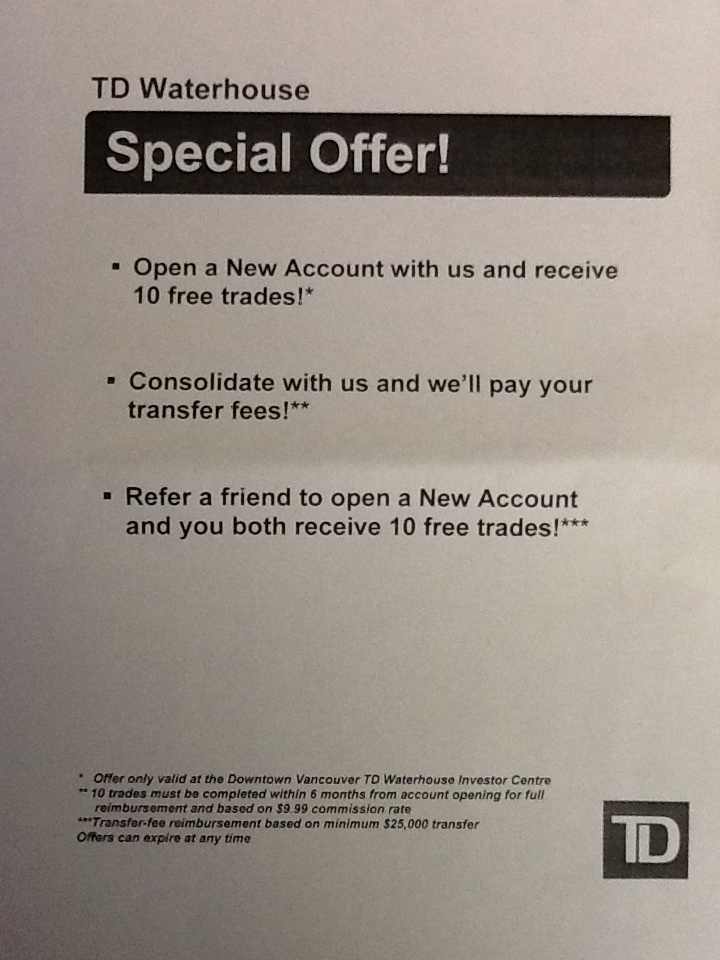Why is commission pricing so complicated? Why is it so hard to get good information? Those are some of the questions that inspired us to create the most user-friendly brokerage comparison and review section in Canada. To be able to compare apples to apples, we had to reverse engineer the marketing and sales pitches, to get down to what trading commissions cost with online discount brokerages.
In an ideal world, consumers would be able to get the lowest rate at a flat fee, no strings attached. While it is difficult to “feel sorry” for a bank or financial institution, providing access to markets and data as well as coordinating transactions is pretty complicated and expensive, which means that like any other business, they have to be able to pay their bills. Translation: companies that charge low commissions may not be able to afford the full suite of services and features that other discount brokerages do.
To fixed-fee or not to fixed-fee?
Flat fee pricing – one number for all your trades, certainly makes the math easier to figure out when keeping track of your costs. Whether or not it is the “best” or lowest flat fee is a different question altogether. “Flat fee” is also different from “fixed fee”.
A truly “flat fee” is just that – a flat price that includes all of the little extra fees that come along with executing a trade. A “fixed fee” for commissions is a fixed commission price you pay per trade, but does not include the “extra” exchange or middle men fees. Because there are a slew of “middle men” that help connect buyers and sellers of a stock, each one of those middle men takes a fee. Usually the most common types of added fees are electronic communication network (ECN) fees and the Securities Exchange Commission (SEC) fees (for US bought stocks). These fees are usually charged as fractions of a cent on the number of shares traded (e.g. $0.0035/share for TSX) and prices vary from ECN to ECN. These ECN fees usually show up when placing market orders rather than limit orders.
If this all seems confusing, what you really need to know is whether your “flat fee” is truly flat or if you still have to pay any additional fees per trade. If you’re choosing an online discount broker, this is one question you’ll want to be sure to ask.
What’s the catch?
Currently, only a handful of Canadian discount brokerages offer truly “flat fee” pricing. Most offer the “fixed fee” model. To qualify for either, though, one usually has to make a certain minimum number of trades in a given amount of time or pay some fee for a data package.
For those discount brokerages that have a threshold to qualify for truly flat fees, the current range of trading activity goes from a minimum of 10 trades per quarter (Credential Direct) to 150 (TD Waterhouse). One of the only discount brokerages that offers flat commission pricing independent of activity level is Virtual Brokers however they have a required monthly data charge that you need to pay for so there is a bit of a string attached there.
One of the biggest benefits of fixed-fee pricing is that you not only know your minimum cost, but you also know your maximum commission cost per trade. Hybrid or variable pricing, however, can get very expensive because there is no “maximum” price you pay per trade. What you pay is determined by the size or dollar value (or both) of your transaction.
What if I don’t trade very much?
If you’re not an active trader, and our research shows that most investors typically don’t trade all that often in a year, the reality is that you will be paying a standard rate. Standard commission rates range anywhere from $6.49 to $29, with most bigger online discount brokerages falling closer to the $29 end of the price spectrum. The exceptions to this are companies that have a fairly tight range of what you can be charged, such as Questrade, which charges you between $4.95 and $9.95, depending on the size of your order, not how often you trade.
Is there a down side to fixed-fee pricing?
Sometimes your trade volumes or activities are not particularly high. If trading a few hundred shares with a handful of transactions a year sounds like you, then variable-fee commissions are not necessarily a bad option. Take Questrade again, with their volume-based pricing you can pay as little as $4.95 (+ECN fees) to be trading 500 shares at any one time. Similarly, Virtual Brokers’ “99” plan can cost you as little as $0.99 for a 100 share trade. From a cost perspective, having to pay $0.99 instead of $29 is a substantial savings if you are not trading often enough in a year to qualify for fixed-fee discounted pricing.
The Bottom Line
In the current Canadian discount brokerage market, there is a lot of competition that is driving commission prices lower. One of the best things you can do to make sense of all the choices is to ask yourself “how often do I trade?”. Once you know that answer, it will be easier to see if going with a broker that offers you “fixed-fee” pricing or “variable-fee” pricing will be the most economical for you. Keep in mind that in order to offer those rock-bottom prices, some other elements of the discount brokerage, such as customer service, accessibility or support resources may not be what they are at other more expensive discount brokerages.
Read the previous article in this series.
Read the next article in this series.







